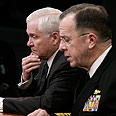
Report: Pentagon updates military plans against Iran
Release of memo sent by US defense secretary to White House on lack of strategy in facing Iranian nuclear progress causes renewed urgency in reviewing attack options. Meanwhile, US defense report warns Iran may threat US with ballistic missile by 2015
WASHINGTON - The Pentagon and US Central Command are updating military plans to strike Iran's nuclear sites and preparing options for President Barack Obama in the event he decides to take such action, CNN reported Monday.
According to the report, efforts have been underway for several weeks in the backdrop of growing concerns among the administration's national security team.
The CNN report comes just a day after the New York Times uncovered the contents of an internal memo relayed by Defense Secretary Robert Gates to the White House noting that the US does not have an efficient long-term policy to handle Iranian nuclear progress.
The memo caused a stir in Washington leaving many outraged in the White House. Gates tried to calm matters by saying, "The memo was not intended as a 'wake up call' or received as such by the president's national security team. Rather, it presented a number of questions and proposals intended to contribute to an orderly and timely decision making process."
He further noted that the "memo identified next steps in our defense planning process where further interagency discussion and policy decisions would be needed in the months and weeks ahead."
The CNN report noted that chairman of the Joint Chiefs of Staff Admiral Michael Mullen criticized his planners for not taking "seriously enough" the need for fresh thinking about how to attack Iran's nuclear sites if the president ordered such a strike. One of Mullen's associates said that he "wanted to create a higher sense of urgency to create military options for the president."
White House Spokesman Robert Gibbs commented on recent statements from Tehran and noted there was a gap between what was being said by the Iranians and what was being done. He noted that the Islamic Republic routinely makes statements about plans which do not correspond with its abilities.
He nevertheless stressed that the US was taking seriously the fact that Tehran wasn't meeting its international obligations.
Ballistic missile threat
Meanwhile the Pentagon cleared for publication a classified report on Monday according to which Iran may be able to build a missile capable of striking the United States by 2015.
"With sufficient foreign assistance, Iran could probably develop and test an intercontinental ballistic missile (ICBM) capable of reaching the United States by 2015," said the April report, a copy of which was obtained by Reuters.
A classified version was also submitted to Congress.
The timing of advances in Iran's long-range missile technology is being closely watched in Washington, which accuses Tehran of pursuing nuclear weapons and is pushing for a new round of sanctions. Iran denies the charges and says its nuclear program is for peaceful purposes.
"Iran's nuclear program and its willingness to keep open the possibility of developing nuclear weapons is a central part of its deterrent strategy," the report said.
It was not immediately clear whether the latest estimate on Iran's missile technology was a departure from a May 2009 National Intelligence Estimate, which deemed Tehran unlikely to have a long-range missile until between 2015 and 2020, according to US officials who saw the report at the time.
The report also included an assessment of Iran's broader military capabilities and support for insurgents in Iraq and Afghanistan, as well as groups like Hamas in the Palestinian territories and Hezbollah in Lebanon.
With Iranian support, Hezbollah has replenished its arsenal beyond levels it had in the 2006 war with Israel, the report said, without offering specifics.
"Iran, through its long-standing relationship with Lebanese (Hezbollah), maintains a capability to strike Israel directly and threatens Israeli and U.S. interests worldwide," it said.
The report cited recently uncovered caches of weapons that Iran's Qods Force gave to Afghan militants. They contained "large amounts of Iranian-manufactured weapons," including 107 mm rockets.
It estimated the size of Iran's "Ground Force" at 220,000 personnel and the Revolutionary Guard Corps's "Ground Resistance Forces" at 130,000 personnel. It said Iran had between 1,800 and 1,900 tanks.
Reuters contributed to this report










